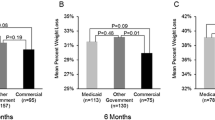Abstract
Background
Socioeconomic status has been a predictor of poor outcome in many surgical diseases including morbid obesity. Potential differences in treatment and initial severity of disease have often not been well controlled in patients with bariatric surgery. This study was performed to compare the results of bariatric procedures in financially disadvantaged Medicaid patients compared to patients with Medicare and those with Commercial insurance under controlled conditions.
Methods
Prospectively collected data from 183 Medicaid, 77 Medicare and 570 Commercial/self-pay insurances were compared to determine the influence of poor economic status on outcome. All the patients received surgical care by the same surgeon at a large University-affiliated private hospital.
Results
Medicaid patients were larger (BMI 58.4 vs. 52.8 and 50.9, respectively) and had a greater incidence of serious comorbid conditions at outset. The death rate and complications were also significantly higher postoperatively in Medicaid patients. However, when the patients were matched for age and BMI, results became similar.
Conclusion
Increases in postoperative mortality and morbidity appear to be associated with advanced disease because of poor access to care. When matched for age, BMI, and severity of disease, outcomes are similar. Changes in Medicaid policies could improve access and outcome.
Similar content being viewed by others
References
Pieracci FM, Eachempati SR, Barie PS, et al. Insurance status, but not race, predicts perforation in adult patients with acute appendicitis. J Am Coll Surg. 2007;205:445–52.
Bouchardy C, Verkooijen HM, Fioretta G. Social class is an important and independent prognostic factor of breast cancer mortality. Int J Cancer. 2006;119:1145–51.
Bradley CJ, Given CW, Roberts C. Race, socioeconomic status, and breast cancer treatment and survival. J Natl Cancer Inst. 2002;94:490–6.
Yoo HY, Thuluvath PJ. Outcome of liver transplantation in adult recipients: influence of neighborhood income, education, and insurance. Liver Transpl. 2004;10:235–43.
Russo MW, Sandler RS, Mandelkehr L, et al. Payer status, but not race, affects the costs of liver transplantation. Liver Transpl Surg. 1998;4:370–7.
Kim C, Diez Roux AV, Hofer TP, et al. Area socioeconomic status and mortality after coronary artery bypass graft surgery: the role of hospital volume. Am Heart J. 2007;154:385–90.
Kapral MK, Wang H, Mamdani M, et al. Effect of socioeconomic status on treatment and mortality after stroke. Stroke. 2002;33:268–73.
Davis ET, Lingard EA, Schemitsch EH, et al. Effects of socioeconomic status on patients’ outcome after total knee arthroplasty. Int J Qual Health Care. 2008;20:40–6.
Hutchings A, Raine R, Brady A, et al. Socioeconomic status and outcome from intensive care in England and Wales. Med Care. 2004;42:943–51.
Santry HP, Lauderdale DS, Cagney KA, et al. Predictors of patient selection in bariatric surgery. Ann Surg. 2007;245:59–67.
Carbonell AM, Lincourt AE, Matthews BD, et al. National study of the effect of patient and hospital characteristics on bariatric surgery outcomes. Am Surg. 2005;71:308–14.
Dallal RM, Bailey L, Guenther L, et al. Comparative analysis of short-term outcomes after bariatric surgery between two disparate populations. Surg Obes Relat Dis. 2008;4:110–4.
Martin LF, Tan T-L, Holmes PA, et al. Preoperative insurance status influences postoperative complication rates for gastric bypass. Am J Surg. 1991;161:625–34.
Paeratakul S, Lovejoy JC, Ryan DH, et al. The relation of gender, race and socioeconomic status to obesity and obesity comorbidities in a sample of US adults. Int J Obes. 2002;26:1205–10.
Flum DR, Salem L, Broeckel Elrod JA, et al. Early mortality among Medicare beneficiaries undergoing bariatric surgical procedures. JAMA. 2005;294:1903–8.
Dallal RM, Datta T, Braitman LE. Medicare and Medicaid status predicts prolonged length of stay after bariatric surgery. Surg Obes Relat Dis. 2007;3:592–6.
Livingston EH, Langert J. The impact of age and Medicare status on bariatric surgical outcomes. Arch Surg. 2006;141:1115–20.
Durkin AJ, Bloomston M, Murr MM, et al. Financial status does not predict weight loss after bariatric surgery. Obes Surg. 199;9:524–6.
Livingston EH, Ko CY. Socioeconomic characteristics of the population eligible for obesity surgery. Surgery. 2004;135:288–96.
Author information
Authors and Affiliations
Corresponding author
Additional information
Disclosure of commercial interest or source of financial or material support: N/A.
Rights and permissions
About this article
Cite this article
Alexander, J.W., Goodman, H.R., Hawver, L.R.M. et al. The Impact of Medicaid Status on Outcome After Gastric Bypass. OBES SURG 18, 1241–1245 (2008). https://doi.org/10.1007/s11695-008-9615-7
Received:
Accepted:
Published:
Issue Date:
DOI: https://doi.org/10.1007/s11695-008-9615-7




